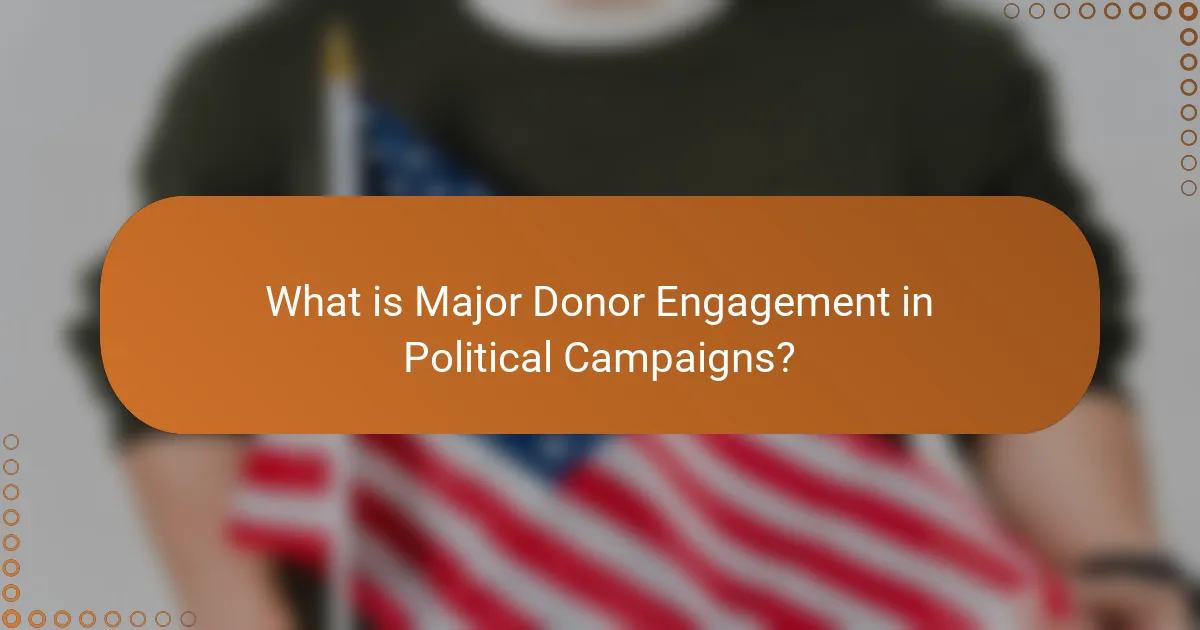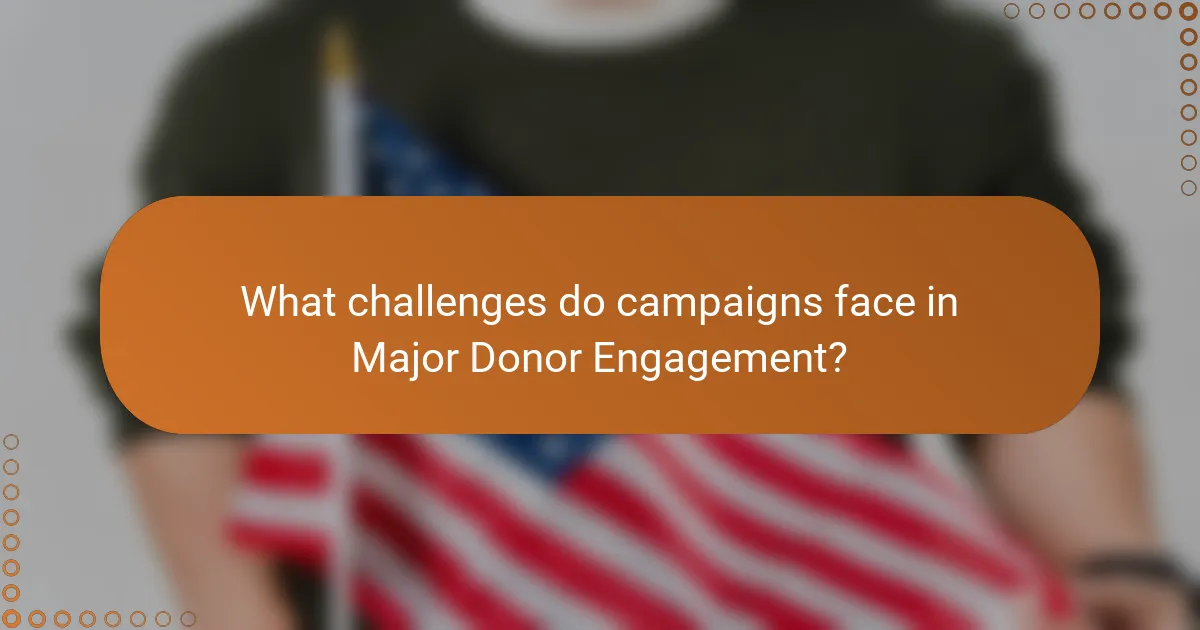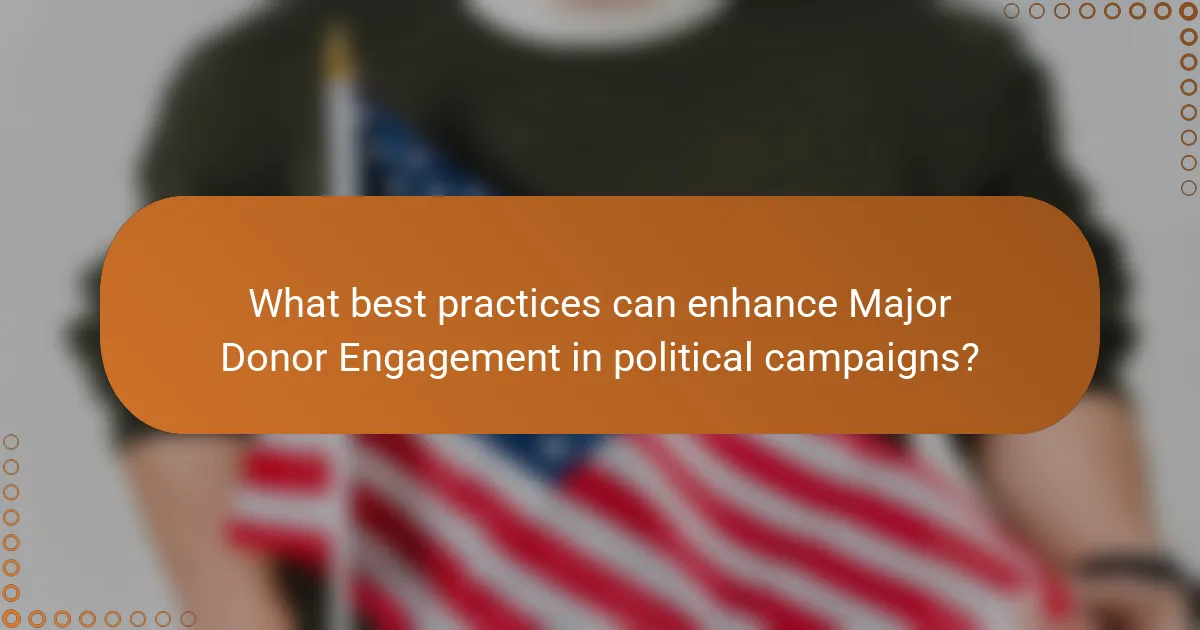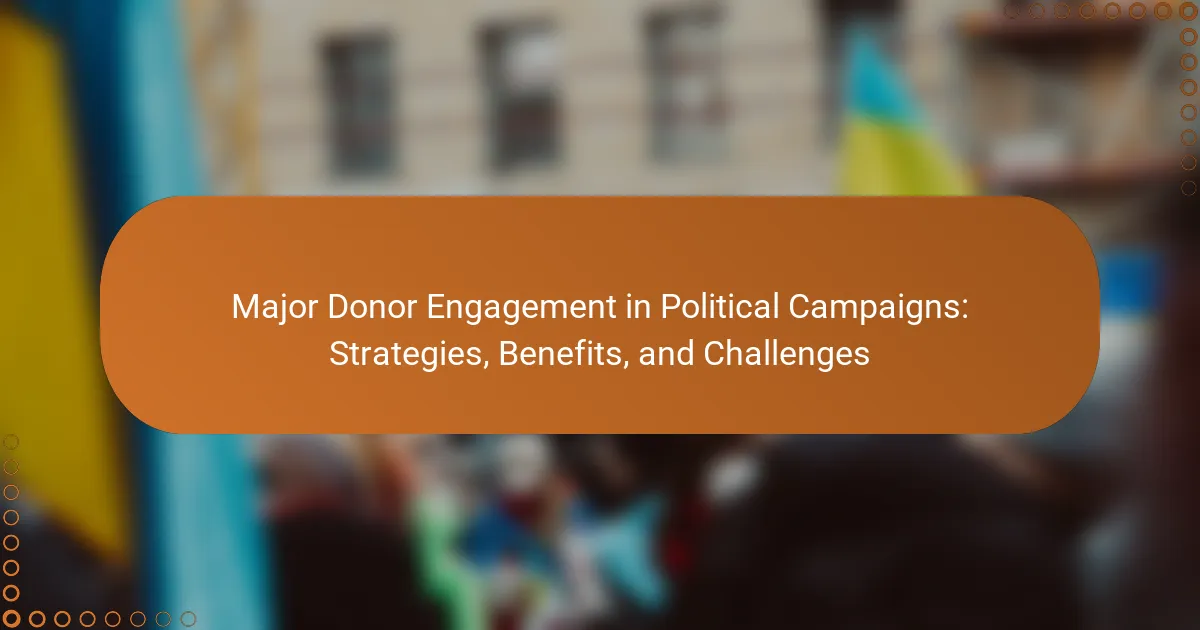Major donor engagement in political campaigns involves strategic efforts to build relationships with individuals who contribute significant financial resources, influencing campaign success. This article outlines the strategies for effective engagement, including personalized communication, exclusive events, and tailored outreach, while also addressing the challenges campaigns face, such as identifying potential donors and maintaining ongoing communication. It highlights the importance of transparency and recognition in cultivating donor relationships and discusses how these practices can lead to increased financial support and advocacy for campaign goals. Additionally, the article examines the competitive landscape and regulatory complexities that can impact donor engagement efforts.

What is Major Donor Engagement in Political Campaigns?
Major donor engagement in political campaigns refers to the strategies used to cultivate relationships with individuals who contribute significant financial resources. These donors typically provide substantial funding that can greatly influence campaign success. Engaging major donors involves personalized communication, exclusive events, and tailored outreach efforts. Campaigns often rely on major donors for a large portion of their funding, as evidenced by data showing that a small percentage of contributors provide a large share of total donations. Effective engagement can lead to increased financial support and advocacy for the campaign’s goals.
How does Major Donor Engagement influence political campaign outcomes?
Major donor engagement significantly influences political campaign outcomes. Engaged major donors provide substantial financial resources. This funding allows campaigns to increase their visibility and outreach. Campaigns with strong major donor support often have higher chances of success. For example, the 2020 U.S. presidential election saw candidates with robust donor networks outperforming others. Additionally, major donors can offer strategic advice and networking opportunities. Their influence can shape campaign messaging and priorities. Studies show that campaigns with engaged major donors tend to attract more grassroots support as well.
What role do major donors play in shaping campaign strategies?
Major donors significantly influence campaign strategies by providing essential financial resources. Their contributions enable campaigns to fund advertising, outreach, and staffing. This financial support often dictates the scale and scope of campaign activities. Campaigns may prioritize issues or messaging that align with the interests of major donors. Additionally, major donors often have access to decision-makers, shaping strategic discussions. Research indicates that candidates who secure large donations tend to have more competitive advantages. Data from the Center for Responsive Politics shows that campaigns receiving substantial donor support can outspend opponents significantly. Thus, major donors play a crucial role in determining campaign priorities and strategies.
How do major donations affect candidate visibility and public perception?
Major donations significantly enhance candidate visibility and shape public perception. Increased funding allows candidates to invest in advertising and outreach efforts. This visibility often translates to higher name recognition among voters. Studies show that candidates with larger financial backing receive more media coverage. Enhanced media presence can lead to a more favorable public image. Furthermore, major donations may signal credibility and support from influential figures. This perceived endorsement can sway undecided voters. Research indicates that candidates with substantial financial support tend to perform better in elections. Thus, major donations play a crucial role in both visibility and public perception.
What are the key strategies for engaging major donors?
Key strategies for engaging major donors include building personal relationships, demonstrating impact, and maintaining regular communication. Personal relationships foster trust and loyalty. Tailored engagement strategies can address individual donor interests. Demonstrating impact shows donors how their contributions make a difference. Providing specific examples of successful initiatives reinforces this connection. Regular communication keeps donors informed and engaged. It can include updates, newsletters, and invitations to events. Acknowledging contributions publicly can enhance donor satisfaction. Research shows that personalized communication increases donor retention rates significantly.
How can campaigns identify and approach potential major donors?
Campaigns can identify potential major donors through research and networking. They should analyze donor databases and wealth indicators. Utilizing platforms like WealthEngine or DonorSearch can provide valuable insights. Campaigns can also attend fundraising events to meet potential donors. Building relationships with existing supporters can lead to referrals.
To approach these donors, campaigns should personalize communication. Tailoring messages to align with the donor’s interests enhances engagement. It’s effective to schedule one-on-one meetings to discuss campaign goals. Demonstrating the impact of their contributions can motivate potential donors.
Research indicates that campaigns that employ these strategies see higher success rates in securing major donations. A study by the Association of Fundraising Professionals found that personalized outreach increases donor retention and engagement significantly.
What communication techniques are effective in building relationships with major donors?
Effective communication techniques for building relationships with major donors include personalized outreach, regular updates, and active listening. Personalized outreach establishes a connection by addressing the donor’s specific interests and values. Regular updates keep donors informed about the impact of their contributions, fostering a sense of involvement. Active listening demonstrates respect for the donor’s opinions and preferences, helping to tailor future engagement strategies. Research indicates that organizations employing these techniques see increased donor retention and satisfaction. For instance, a study by the Association of Fundraising Professionals found that personalized communication significantly enhances donor relationships.
What benefits does Major Donor Engagement provide to political campaigns?
Major donor engagement provides significant financial support to political campaigns. This funding allows campaigns to execute broader outreach and advertising strategies. Engaging major donors also enhances credibility and visibility within the political landscape. Campaigns often benefit from the networks and influence that major donors possess. Moreover, major donors may offer strategic advice and guidance based on their experience. Research indicates that campaigns with strong major donor engagement can raise up to 60% more funds compared to those without. This financial leverage enables campaigns to compete effectively against opponents. Overall, major donor engagement is critical for resource mobilization in political campaigns.
How does increased funding from major donors impact campaign resources?
Increased funding from major donors significantly enhances campaign resources. This influx allows campaigns to expand their outreach efforts. More funds enable higher quality advertisements and promotional materials. Campaigns can also hire additional staff for better organization and strategy. Enhanced funding supports more extensive voter engagement initiatives. It allows for advanced data analytics to target potential voters effectively. Historical data indicates that campaigns with substantial donor support often see increased voter turnout. For example, the 2020 U.S. presidential campaigns demonstrated that candidates with higher donor contributions had more resources for mobilization efforts.
What advantages do campaigns gain from the support of influential donors?
Campaigns gain significant advantages from the support of influential donors. Influential donors provide substantial financial resources that enhance campaign visibility. This financial backing allows campaigns to invest in advertising, outreach, and events. Increased funding leads to a broader reach and more effective communication strategies. Influential donors often bring credibility and prestige to a campaign. Their endorsement can attract additional supporters and media attention. Furthermore, these donors may offer strategic advice and networking opportunities. This can lead to connections with other potential supporters and stakeholders. Overall, the support of influential donors is crucial for campaign success.

What challenges do campaigns face in Major Donor Engagement?
Campaigns face several challenges in Major Donor Engagement. One significant challenge is identifying and cultivating relationships with potential major donors. Many campaigns struggle to find individuals with the capacity and willingness to contribute large sums. Another challenge is effectively communicating the campaign’s vision and goals to these donors. Misalignment in values or expectations can lead to disengagement. Additionally, maintaining ongoing communication and stewardship is crucial but often overlooked. Campaigns may also face competition from other organizations vying for the same donor pool. This competition can dilute the effectiveness of engagement efforts. Lastly, navigating legal and regulatory compliance regarding campaign contributions can complicate the engagement process. These challenges can hinder a campaign’s ability to secure necessary funding.
How can campaigns navigate potential ethical concerns with major donations?
Campaigns can navigate potential ethical concerns with major donations by implementing transparency measures. They should disclose the sources and amounts of donations publicly. This practice builds trust with constituents and stakeholders. Establishing clear guidelines for accepting donations is essential. Campaigns must ensure that donations align with their values and mission. Engaging in regular audits of funding sources can help identify any conflicts of interest. Additionally, campaigns should seek diverse funding sources to mitigate dependency on single donors. This approach reduces the risk of undue influence from major donors. By fostering open communication about funding, campaigns can address ethical concerns proactively.
What are the risks associated with relying heavily on major donors?
Relying heavily on major donors poses several risks. One significant risk is the potential for over-dependence on a small number of individuals. This can lead to financial instability if those donors withdraw their support. Another risk involves the possibility of compromising the organization’s mission. Major donors may exert influence over decision-making processes, prioritizing their interests over broader community needs. Additionally, there is a risk of reputational damage. If a major donor becomes embroiled in controversy, the organization may suffer backlash. Furthermore, reliance on major donors can limit fundraising diversity. A narrow funding base makes it challenging to engage with a wider donor community. Lastly, there may be ethical concerns regarding transparency and accountability. Heavy reliance on a few donors can raise questions about the integrity of the organization’s funding sources.
How can campaigns address donor expectations and demands?
Campaigns can address donor expectations and demands by prioritizing transparency and communication. Regular updates on campaign progress and financial status help build trust. Providing detailed reports on how donations are utilized assures donors their contributions are impactful. Engaging donors through personalized outreach fosters a sense of inclusion. Tailoring communication to match donor interests enhances satisfaction. Additionally, soliciting feedback from donors demonstrates responsiveness to their needs. Studies show that campaigns with strong donor engagement strategies raise 30% more funds. Implementing these practices can lead to sustained donor support and loyalty.
What are the implications of changing donor landscapes on campaign strategies?
Changing donor landscapes significantly impact campaign strategies. Campaigns must adapt to shifting donor demographics and preferences. This includes reevaluating funding sources and targeting new donor segments. Increased competition for major donors may require more personalized engagement strategies. Campaigns may also need to leverage digital platforms for outreach. Data analytics can help identify potential donors and tailor messaging. Understanding donor motivations is crucial for effective communication. The evolving landscape demands flexibility in fundraising approaches.
How do economic factors influence donor behavior in political campaigns?
Economic factors significantly influence donor behavior in political campaigns. Donors often assess their financial situation before contributing. Economic stability or growth typically encourages higher donation levels. Conversely, economic downturns can lead to reduced contributions. Research shows that individuals with higher disposable incomes are more likely to donate. For instance, during the 2020 U.S. presidential election, wealthier donors accounted for a substantial portion of campaign funding. Additionally, economic policies proposed by candidates can sway donor preferences. Donors may align their contributions with candidates advocating for favorable economic reforms. Overall, economic conditions and personal financial health play crucial roles in shaping donor engagement in political campaigns.
What trends are emerging in major donor engagement tactics?
Emerging trends in major donor engagement tactics include personalized communication and data-driven strategies. Organizations increasingly utilize tailored messaging based on donor interests and past contributions. This approach enhances connection and engagement with major donors. Additionally, leveraging technology for analytics allows campaigns to identify donor preferences and optimize outreach efforts. Virtual events have also gained traction, offering interactive experiences that foster community among donors. According to a 2022 study by the Association of Fundraising Professionals, personalized engagement can increase donor retention rates by up to 30%. These trends reflect a shift towards more strategic and relationship-focused engagement in political fundraising.

What best practices can enhance Major Donor Engagement in political campaigns?
Personalized communication enhances Major Donor Engagement in political campaigns. Tailoring messages to individual donor interests fosters a deeper connection. Regular updates on campaign progress keep donors informed and engaged. Exclusive events for major donors create a sense of belonging and appreciation. Transparency about fund allocation builds trust and strengthens relationships. Recognizing donor contributions publicly can encourage ongoing support. Establishing a feedback loop allows donors to share their thoughts and feel valued. Research shows that campaigns utilizing these practices see increased donor retention and financial support.
How can campaigns effectively cultivate long-term relationships with major donors?
Campaigns can effectively cultivate long-term relationships with major donors by prioritizing consistent communication. Regular updates on campaign progress and impact create a sense of involvement. Personalizing interactions enhances the connection with donors. Tailoring messages to align with donors’ interests fosters engagement. Acknowledging and celebrating donor contributions strengthens loyalty. Hosting exclusive events for major donors builds community and trust. Providing transparent financial reports assures donors of responsible fund management. Research shows that campaigns with strong donor relationships see increased funding stability over time.
What role does transparency play in fostering trust with major donors?
Transparency is crucial in fostering trust with major donors. It involves open communication regarding financial practices and campaign strategies. When organizations share detailed information about how funds are utilized, donors feel more secure about their contributions. Studies indicate that 87% of donors prefer transparency in financial reporting. This openness reduces skepticism and builds a positive relationship. Trust is further enhanced when organizations are accountable for their actions. Major donors are more likely to engage when they see a commitment to ethical practices. Overall, transparency acts as a foundation for lasting donor relationships.
How can campaigns leverage technology to improve donor engagement?
Campaigns can leverage technology to improve donor engagement by utilizing data analytics, personalized communication, and digital platforms. Data analytics allows campaigns to understand donor preferences and behaviors. This insight enables targeted outreach, increasing the likelihood of donations. Personalized communication, such as tailored emails and messages, fosters a sense of connection with donors. Digital platforms, including social media and crowdfunding sites, expand reach and facilitate easy contributions. A study by the Pew Research Center shows that 69% of Americans use social media, highlighting its potential for engagement. Additionally, mobile apps can streamline donation processes, enhancing convenience for donors. Overall, integrating technology into campaign strategies effectively boosts donor engagement.
What practical tips can campaigns implement for successful Major Donor Engagement?
Campaigns can implement several practical tips for successful Major Donor Engagement. First, establish personalized communication with major donors. Tailored messages show appreciation and understanding of their interests. Second, host exclusive events for major donors. These gatherings foster relationships and provide opportunities for direct interaction with campaign leaders. Third, provide regular updates on campaign progress. This keeps donors informed and engaged with the campaign’s goals and achievements. Fourth, recognize major donors publicly. Acknowledgment can enhance their commitment and encourage others to contribute. Fifth, solicit feedback from major donors. This helps campaigns understand donor perspectives and refine engagement strategies. Finally, ensure transparency about fund usage. Donors are more likely to engage when they see how their contributions make an impact. These strategies are supported by research indicating that personalized engagement can increase donor retention and satisfaction.
Major donor engagement in political campaigns involves strategies aimed at cultivating relationships with individuals who contribute significant financial resources, which are crucial for campaign success. The article explores how major donor engagement influences campaign outcomes, shapes strategies, enhances candidate visibility, and provides financial support. It also addresses the challenges campaigns face in engaging major donors, including ethical concerns and competition for funding. Additionally, the article outlines effective communication techniques, best practices for fostering long-term relationships, and the role of technology in improving donor engagement, ultimately highlighting the importance of transparency and personalized outreach in securing major donations.
